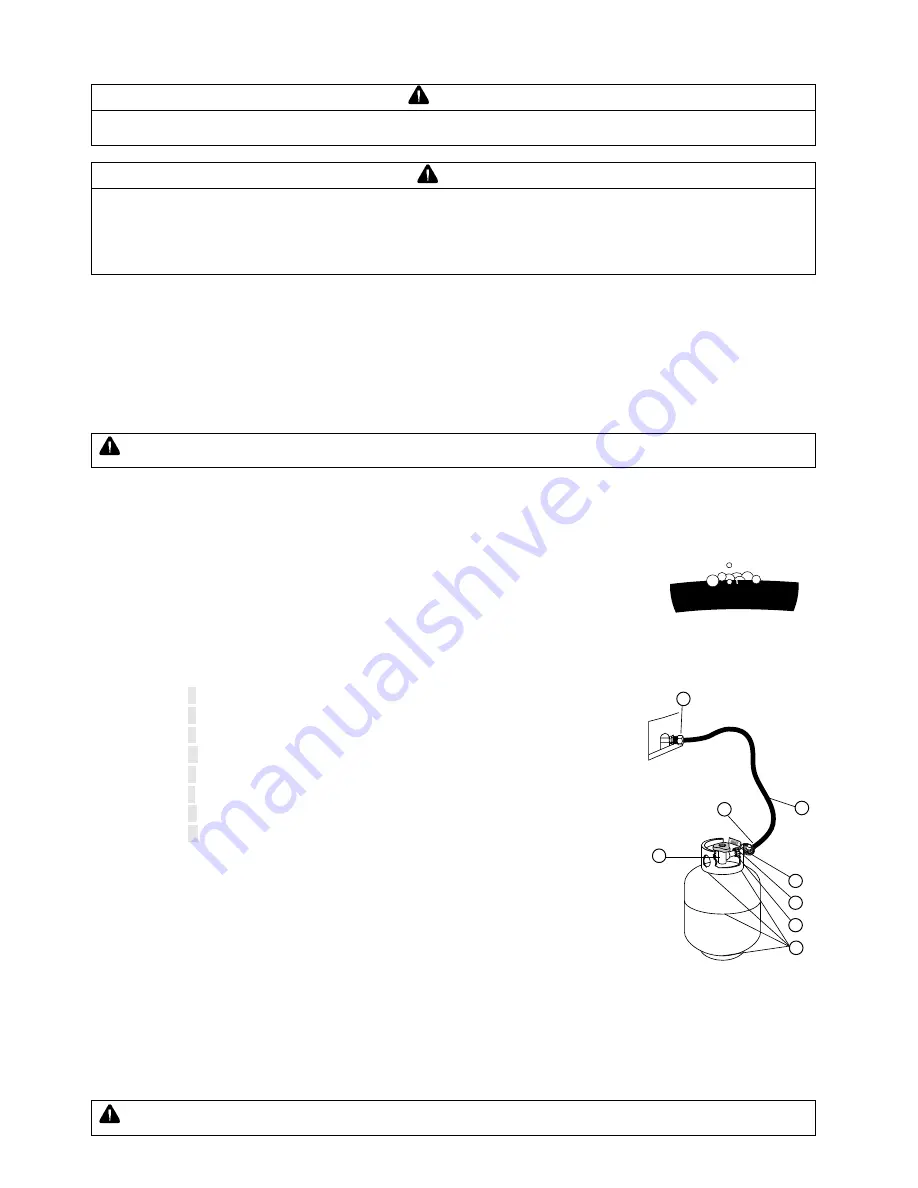
BY16-101-003-04 / English
7/15
LEAK TESTING
WARNING
Never use your grill without leak testing all gas connections, hoses and propane tank. Follow the section on
‘Leak Testing’ of this manual for proper procedures.
DANGER
To prevent fire or explosion hazard:
DO NOT smoke or permit ignition sources in the area while conducting a leak test.
Perform test OUTDOORS in a well-ventilated area that is protected from the wind.
Never perform a leak test with a match or open flame.
Never perform a leak test while the grill is in use or while grill is still hot.
WHEN TO PERFORM A LEAK TEST:
After assembling your grill and before lighting for the first time, even if purchased fully-assembled.
Every time the LP gas cylinder is refilled, exchanged or if any of the gas components are disconnected or
replaced.
Any time your grill has been moved.
At least once per year or if your grill has not been used for more than 60 days.
CHECKING FOR LEAKS:
CAUTION:
Strong odors, colds, sinus congestion, etc. may prevent the detection of propane
by smell. Use caution and common sense when testing for leaks.
Note: The leak test must be performed in an area that has adequate lighting in order to see if bubbles are developing
and not in a windy or noisy area so larger leaks can be detected by smell or sound.
1.
Create a mixture of 50% water and 50% liquid dishwashing soap.
2.
Open the lid.
3.
Ensure all control knobs are set to the ‘OFF’ position.
4.
Turn on the gas at the cylinder valve. Turn the cylinder valve knob
counter-clockwise until fully opened. If you hear a rushing sound or smell gas,
turn the gas off. Tighten any leaking connections. If leak is detected at
connection nut and tightening does not stop leak, re-inspect propane tank
rubber seal.
5.
Apply the soapy water mixture to the following:
A Supply tank (cylinder) welds.
B Connection nut to tank valve.
C Back side of connection nut to brass nipple.
D Brass nipple connection into regulator.
E
Regulator connections to gas supply hoses.
F
Hose connection to gas manifold.
G The full length of gas supply hose.
H Tank valve to cylinder.
6.
Check each place listed (A-H) for growing bubbles, which indicates a
leak. Large leaks may not be detected by bubbles but should produce
a rushing sound or gas smell.
7.
Turn off gas supply at cylinder valve.
8.
Turn on control knobs to release gas pressure in hose.
9.
Turn control knobs to ‘OFF’ position.
10.
Tighten any leaking connections. If leak is detected at connection nut
and tightening does not stop leak, re-inspect propane tank rubber seal.
11.
Repeat soapy water test until no leaks are detected.
12.
Turn off gas supply at cylinder valve until you are ready to use your grill.
13.
Wash off soapy residue with cold water and towel dry.
14.
Wait 5 minutes to allow all gas to evacuate the area before lighting grill.
WARNING:
DO NOT
use the grill if leaks cannot be stopped. Contact a qualified gas appliance repair
service.
A
B
C
D
E
F
G
H
Watch For Bubbles

































